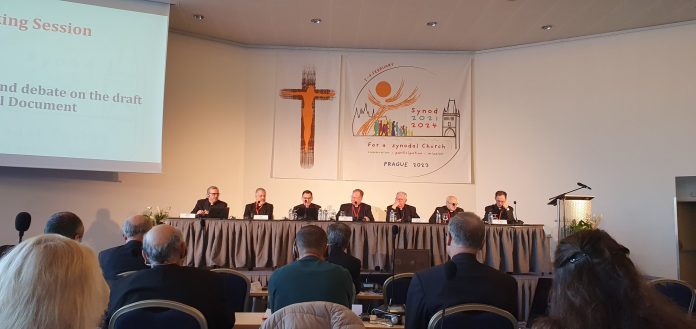We have experienced four days of listening and dialogue based on the resonances aroused by the Working Document for the Continental Stage within the Churches from which we come. As the European Continental Assembly, we realise that we have had a profoundly spiritual experience through the synodal method.
We give thanks to the Spirit who guided us for the gift we received and here we wish to share it. We deepened the insights that the ecclesial communities of our continent have gained through the synodal process, as well as the tensions and questions that the European Churches are facing[1]. Above all, we once again felt the pain of the wounds that mark our recent history, starting with those that the Church has inflicted through the abuses perpetrated by people who were performing an ecclesial ministry or office. We have mentioned several times the ruthless violence of the aggression war disfiguring Ukraine. We thought about the victims of the earthquake that devastated Turkey and Syria.
Our work has been rich and exciting, though not without its problems and difficulties. It has allowed us to look into the eyes of the Church in Europe, with all the treasures of the two great Latin and Eastern traditions that make it up. With an awareness that has grown over the course of the Assembly, we feel today that we can affirm that our Church is beautiful, showing a variety that is also our wealth. We feel that we love her even more deeply, in spite of the wounds she has inflicted, for which she needs to ask forgiveness in order to be able to move on to reconciliation, the healing of memory and the welcoming of the wounded. We are convinced that these sentiments also fill the hearts of all the people who have been involved in the journey of Synod 2021-2024 since September 2021.
Throughout the days of the Assembly, we went through a spiritual experience that it is possible to meet, listen to each other and dialogue starting from our differences and beyond the many obstacles, walls and barriers that our history puts in our way. We need to love the variety within our Church and support each other in mutual esteem, strengthened by our faith in the Lord and the power of his Spirit.
This is why we wish to continue walking in a synodal style: more than a methodology, we consider it a way of life of our Church, of communal discernment and of discernment of the signs of the times. Concretely, we want this Continental Assembly not to remain an isolated experience, but to become a periodic appointment, based on the general adoption of the synodal method that permeates all our structures and procedures on all levels. In this style, it will be possible to address the issues on which our efforts need to mature and intensify: the accompaniment of the wounded, the ‘protagonism’ of young people and women, the learning from marginalised people, etc.
The synodal style also allows us to address tensions from a missionary perspective, without being paralysed by fear, but drawing from them the energy to continue along the way. Two in particular have emerged in our work. The first encourages unity in diversity, escaping the temptation of uniformity. The second links the readiness to welcome as a witness to the Father’s unconditional love for his children with the courage to proclaim the truth of the Gospel in its entirety: it is God who promises “Love and truth will meet” (Ps 85:11).
We know that all this is possible because we have experienced it during this Assembly, but even more because the life of the Churches from which we come bears witness to it. We are thinking here in particular of ecumenical dialogue, which have echoed strongly in our work, and also of inter-religious dialogue. But above all, we believe that it is possible because grace is involved: building an increasingly synodal Church is a way to concretely implement the equality in dignity of all the members of the Church, founded in baptism. It configures us as children of God and members of the body of Christ, co-responsible for the unique mission of evangelisation entrusted by the Lord to his Church.
We are confident that the continuation of Synod 2021-2024 can support and accompany us, in particular by addressing at the level of the Synodal Assembly some priorities:
- deepen the practice, theology and hermeneutics of synodality. We have to rediscover something that is ancient, belongs to the nature of the Church, and is always new. This is a task for us. We are taking the first steps on a path that opens up as we go along it;
- address the question of an all ministerial Church, as the horizon of a reflection on charisms and ministries (ordained and non-ordained) and the relationships between them;
- explore the forms of a synodal exercise of authority, i.e. the service of accompanying the community and safeguarding unity;
- clarify criteria for discernment on the synodal process and which decisions belong on which level, from the local to the universal.
- take concrete and courageous decisions on the role of women within the Church and on their greater involvement at all levels, also in decision-making and decision-taking processes;
- consider the tensions around the liturgy, so as to synodally re-understand Eucharist as the source of communion;
- foster the formation to synodality of the whole People of God, with particular regard to the discernment of the signs of the times with a view to carrying out the common mission;
- renew a lively sense of mission, bridging the gap between faith and culture to bring the Gospel back to people’s feelings, finding a language capable of articulating tradition and aggiornamento, but above all, walking with people rather than talking about them or to them. The Spirit asks us to listen to the cry of the poor and the earth in Europe, and in particular the desperate cry of the victims of war who demand a just peace.
Loving the Church, the richness of its diversity, is not a form of sentimentalism for its own sake. The Church is beautiful because the Lord wants her to be so in view of the task he has entrusted to her: to proclaim the Gospel and invite all women and men to enter into the dynamic of communion, participation and mission that constitutes her raison d’être, animated by the perennial vitality of the Spirit. To build our European Church means then to renew our commitment to carry out this mission, even on our continent, in a culture marked by the many diversities we know.
We entrust the continuation of our Synodal journey to the Patron Saints and martyrs of Europe!
Adsumus Sancte Spiritus!
[1] Of this work will give account a more articulated document that will be sent to the General Secretariat of the Synod as a contribution to the next steps of the Synod process, and mainly the drafting of the Instrumentum laboris of the Synodal Assembly taking place in October. Together with a lot of information on our work and videorecordings of all the plenary sessions, this document will be available on the website of the Prague Continental Assembly, https://prague.synod2023.org, and on the websites of the Bishops’ Conferences that wish to make it public in the different national languages.
originally posted at https://www.synod2023.org/blog/2023/02/09/european-continental-assembly-final-remarks/



